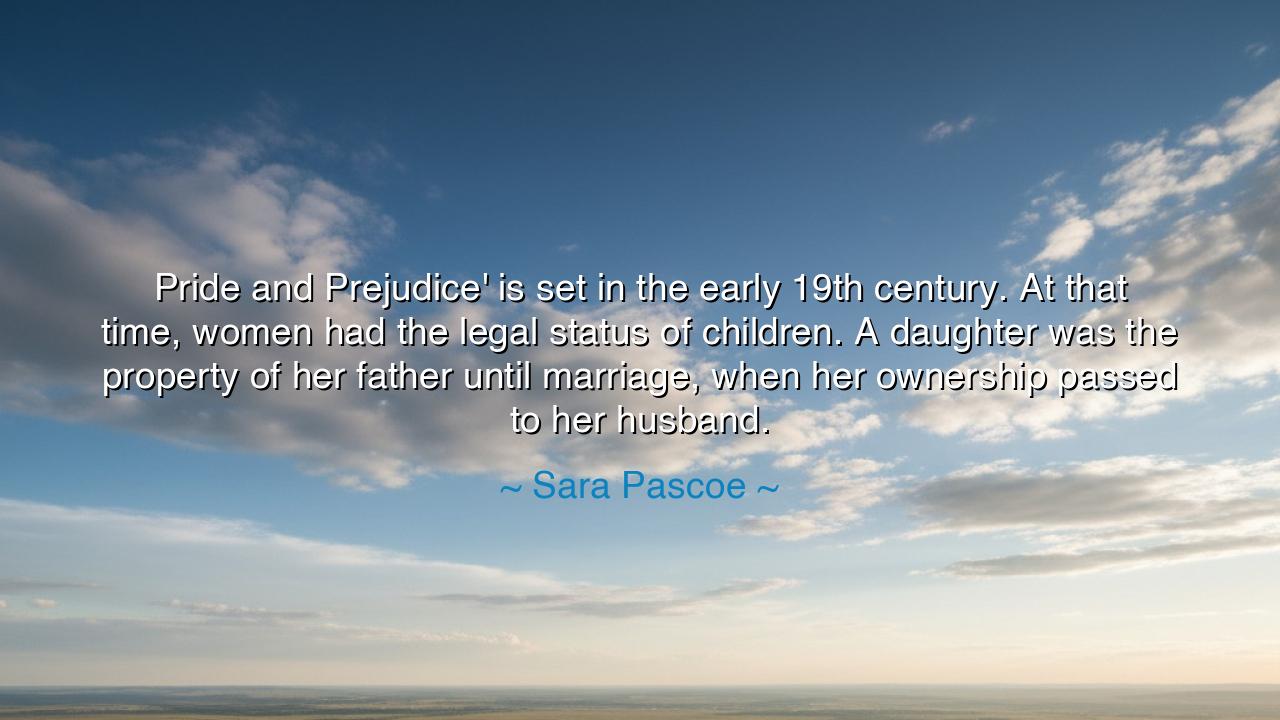
Pride and Prejudice' is set in the early 19th century. At that
Pride and Prejudice' is set in the early 19th century. At that time, women had the legal status of children. A daughter was the property of her father until marriage, when her ownership passed to her husband.






"‘Pride and Prejudice’ is set in the early 19th century. At that time, women had the legal status of children. A daughter was the property of her father until marriage, when her ownership passed to her husband." Thus spoke Sara Pascoe, revealing with stark clarity the hidden bars of the prison in which women once lived. Her words tear the veil of romance from Austen’s world, reminding us that beneath the ballrooms and drawing rooms lay a brutal truth: that women were not sovereign over their own lives, but bound as property, first to father, then to husband.
The origin of this wisdom lies in the laws of that era. In the England of Jane Austen, the doctrine of coverture reigned supreme. A woman’s identity was subsumed into that of her husband; her property became his, her legal voice silenced, her independence erased. Unmarried daughters lived under the authority of their fathers, like children with no true claim to autonomy. Marriage was not merely a union of hearts but a transfer of ownership, a contract of possession, cloaked in the language of respectability. Pascoe’s words reveal how deeply this injustice shaped both life and literature.
Consider the fate of Caroline Norton, a 19th-century Englishwoman whose writings and pleas shook society. Married to a cruel husband, she was denied the right to leave him and barred from seeing her children. By law, they were his property, as she herself was. Her case brought light to the cruelty of coverture and spurred reforms, including the Custody of Infants Act. But before such changes, countless women lived like Norton—silenced, trapped, and treated as dependents rather than free souls. Her story, like Austen’s fiction, shows how marriage and family were entangled with law, not love alone.
This truth is also visible in Austen’s own Pride and Prejudice, where the fate of the Bennet daughters hinges not on their talents or desires, but on the fortune of the men they marry. The estate is entailed away from them, bound by laws that deny daughters inheritance. Their security lies only in attaching themselves to husbands—a reflection not of laziness or vanity, but of necessity. Behind the witty dialogue and delicate dances lies a sobering reality: women were trained to seek marriage not as romance, but as survival.
Pascoe’s words awaken us to the heroism of women who endured this system with dignity, and those who resisted it in silence or in rebellion. They show us that progress is never given freely, but won through centuries of struggle, through voices raised, laws challenged, and traditions broken. They remind us that what seems quaint in novels was, in truth, a battlefield for autonomy and humanity.
The lesson is plain: never forget how fragile freedom can be. The rights enjoyed by women today—to own property, to vote, to inherit, to stand equal before the law—were once unthinkable, and they were not gifts, but victories. To remember the past is to guard the present, lest complacency allow old chains to return in new forms. For injustice thrives not only in cruelty, but in forgetfulness.
What practical steps must we take? Teach the history of women’s legal struggles, so the young understand the cost of their freedoms. Honor the stories of those like Caroline Norton, whose pain became a spark for change. And in our own time, continue to watch for laws, customs, and myths that seek to diminish equality. True justice is not static; it must be guarded, renewed, and expanded by every generation.
So let Pascoe’s words echo as both remembrance and warning: once, women were treated as children, as property, as voices without power. Today, they walk freer—but the path of freedom is never finished. Remember, and act, so that no daughter need again be passed as possession, but may live as sovereign of her own soul.






AAdministratorAdministrator
Welcome, honored guests. Please leave a comment, we will respond soon